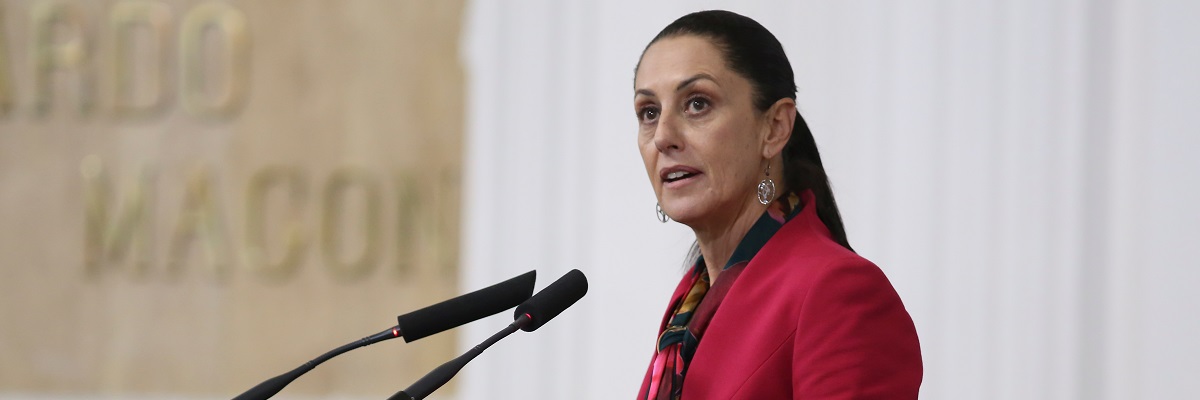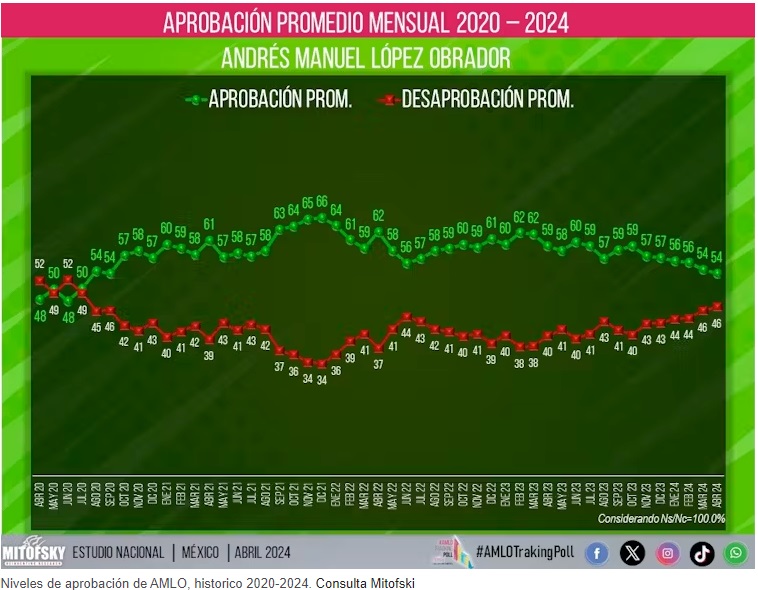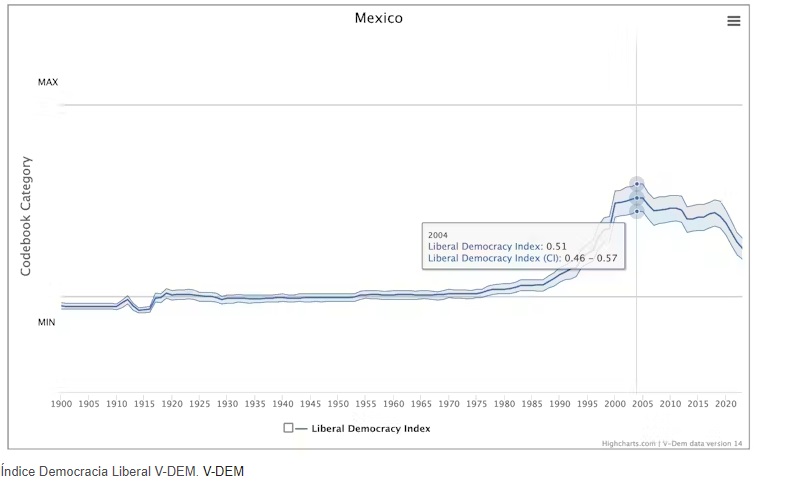Diplomacy
From AMLO to Claudia Sheinbaum: Mexicans entrust power to a woman with the challenge of improving democratic quality

Image Source : Shutterstock
Subscribe to our weekly newsletters for free
If you want to subscribe to World & New World Newsletter, please enter
your e-mail
Diplomacy

Image Source : Shutterstock
First Published in: Jun.03,2024
Jun.17, 2024

With this Instagram post, Claudia Sheinbaum announced her overwhelming victory, which doubled the numbers of her main contender, in a gender perspective. The fact that one of the most macho countries in the Americas has chosen a female president among two female engineers reflects the historic change experienced. Sheinbaum, candidate of the Morena party and the popular leader Andrés Manuel López Obrador, was the clear favorite to win the elections. The cards seemed to be laid out. It was reminiscent of the 2018 election, where the leftist AMLO remained ahead in the polls, at least two years before the electoral appointment. Regardless of what happened during the campaign, AMLO, like Sheinbaum now, was always the front-runner during the contest. The big difference between the 2024 scenario and that of 2018 is that the change is not a massive ambition this time. At that time, traditional Mexican political parties had bet on fear of AMLO as their main message, but in an environment of significant system discredit, the electorate's biggest fear in 2018 was continuity.
Throughout the entire government term, President López Obrador enjoyed significant stability in his popularity, according to the polling firm Mitofski. Based on those high levels of popularity, he managed to fully endorse his candidate, Sheinbaum, and his party, Morena.

Including Sheinbaum, only ten women have been heads of state in Latin America through the popular vote. Several of them have done so on the shoulders of prominent male figures who endorsed their votes. Today, Sheinbaum comes to power with the popularity of AMLO, just as happened before with Dilma Rousseff in Brazil, victorious with Lula's endorsement, or those who received the endorsement of their husbands, like Violeta Chamorro in Nicaragua, the Honduran Xiomara Zelaya, or the Argentinian Cristina Fernández de Kirchner. Sheinbaum’s campaign strategy unequivocally acknowledged that her formula was one of continuity with López Obrador. She reaffirmed this after the victory:

It will be from now on when we see how much Sheinbaum separates herself from those shoulders, or if her presidency will bear the stamp of AMLO's tutelage.
Despite being a country where machismo is caricatured as part of Mexican culture, and where one in every four Mexican men believes that being male guarantees better political performance, Mexico has positioned itself relatively well in terms of gender equality, ranking 33rd out of 146 countries evaluated according to the Global Gender Gap Report 2023 (GGG). Among countries in Latin America and the Caribbean, Mexico ranks sixth out of 22. Regarding access to education and health, it has virtually achieved gender parity since 2006. It is in the realm of political empowerment (the third of the sub-indices measured in the report's methodology) where the most progress towards gender equality has been made in the country. In 2023, Mexico ranked 15th out of 146 countries evaluated, representing a significant leap forward in recent years. There are parity laws in Congress with gender quotas implemented in 2014 that guarantee political participation and representation. The greatest challenge facing the new president Sheinbaum in this regard is gender equality in the economic sphere. According to the GGG, the country ranks among the lowest globally in this sub-index. While 76% of men participate in the workforce, only 44% of women do so. In terms of average income and wage equality, Mexico ranks among the worst positions.
But challenges exist in other areas as well. Far beyond the gender issue, Mexican democracy and governance are plagued by serious problems that Sheinbaum will have to address. The issue of security is grave. Violence ran rampant during the campaign, setting records. The pressure of social programs is also significant. Democratic quality, according to V-DEM data on the liberal democracy index in Mexico, reached its peak after the alternation in 2000, during Vicente Fox's government. However, since then, the indicator has been declining.

This indicator is based on Robert Dahl's concept of "polyarchy," which emphasizes the importance of protecting individual rights and those of minorities against the tyranny of the state and the tyranny of the majority. The liberal model takes a negative view of political power insofar as it values the quality of democracy more if there are limits and checks on the government. This is achieved through constitutionally protected civil liberties, a strong rule of law, an independent judiciary, and effective checks and balances that, together, limit the exercise of executive power. For this to be a measure of liberal democracy, the index also takes into account the level of electoral democracy. The Mexican election of 2000, which made Vicente Fox, the PAN candidate, president, can be considered a critical election as it ended 70 years of uninterrupted PRI governments. Fox won with a historically strong and well-institutionalized party, but his campaign platform included significant innovations in terms of volunteerism and mobilization that came from outside the party structure. The first PAN president was a businessman who had chaired the Latin American division of Coca-Cola. He brought different ideas about organization and marketing possibilities, both for the campaign and for the government. From there, healthy reforms were made in democratic and electoral institutions. However, the index has been declining during López Obrador's administration. Presidential efforts to make changes in electoral institutions have raised alarms. During his tenure, AMLO has questioned the independence of the National Electoral Institute (INE), he has announced plans to dismantle the INAI (official transparency body) before leaving the Presidency, and delegitimize judicial instances, acknowledging his direct influence over Supreme Court justices.
The scope of Sheinbaum's victory, AMLO's, and, in general, Morena's is notable, not only in the presidential chapter. Perhaps more impact is what it implies at the parliamentary level. Pending the final scrutiny, the ruling alliance could have a qualified majority, both in the Chamber of Deputies and in the Senate, paving the way for constitutional changes. The necessary balances are at stake. The system of checks and balances in the parliament and in the states of the Republic has been greatly weakened, which identifies clear dangers for Mexican democracy. The relative stability of Mexican political parties during the 21st century contrasts with that of other Latin American countries. Unlike the rest of the countries in the region, where new parties have proliferated at a dizzying pace, only seven new parties have emerged in Mexico in these two decades, and three of them are linked to Andrés Manuel López Obrador's candidacy in 2018. Three periods after Fox's rise to power, AMLO's victory in 2018 showed, live and direct, the implosion of the Mexican party system.
It is possible to foresee, given López Obrador's institutional behavior during his presidency, that the judiciary and electoral authority will continue to be under pressure, to levels hitherto unknown. Claudia Sheinbaum will need to quickly put an end to this if she wants to demonstrate a democratic attitude. The underlying problem in 2024 lies in the weakness of political parties to address these new times ahead. Electoral losers need a thorough analysis, with a good dose of self-criticism, and a solid strategy for the immediate future.
First published in :

She is a political and academic consultant. PhD in Communication from the University of Navarra (UNAV), her doctoral thesis titled 'Cyberpolitics in Latin America: a model to measure its influence on critical instability' was awarded Cum Laude. She presides over DatastrategIA Consultores and is a co-founder of the Latin American Political Consultants Organization (OCPLA). She is a professor of Political Communication at the University of Navarra, IESA (Venezuela), and the University of Pforzheim (Germany). She obtained a Master's degree in Business Administration (IESA, Venezuela) and in Electoral Campaigns (University of Florida, USA).
Unlock articles by signing up or logging in.
Become a member for unrestricted reading!